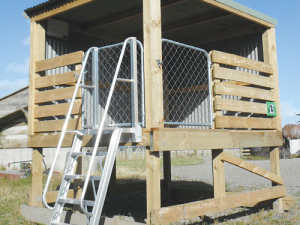For many farmers, ‘compliance’ is a word that evokes images of short-stature, goose-stepping individuals with clipboards and funny moustaches.
But we need to take seriously a topical compliance issue coming up: the new bobby calf regulations, in particular to have truck-level loading facilities.
Some farmers will be upset by these changes; others will be questioning why they didn’t happen years ago. Personally, I listen to people who say they can’t build them, and I look at any of the building projects I have done around my house and ask what has happened to the can-do Kiwi farmer.
Some people will question the economics of building a loading facility, based on the return from bobby calves. But it isn’t the value of bobby calves you need to be looking at, it’s the value of your milk. We can’t seperate anything we do on our farms from the perceived value of that milk.
Newborn calves are the most vulnerable animals on our farms. How we treat them is the litmus test for animal welfare in what we do. If the result isn’t what consumers expect, then your milk will in effect drop in value and unfortunately you take the value of mine with it.
Compliance and doing the right thing don’t have to be costly. With calf loading facilities, for example, when I moved to my current farm in 1998 it was a conversion; I was starting fresh and that blank canvas allowed me to question accepted practices.
Building a bobby pen by the road made little sense to me; it would take me an extra 15-20 minutes a day to take the calves from the rearing shed, put them in a trailer, drive the trailer to the road and lift the calves into the bobby pen. Having the ability to load directly from the shed straight into the truck saved my time and the truck driver’s back.
Perhaps an even better example is employment compliance. I have moved from doing a half-arsed job on paper which, if done right, would take me a couple of hours a fortnight, but it was likely not very compliant. I then moved to a mix of computer programmes and apps, and the task was reduced to 30 minutes and was slightly more compliant.
Now I have one payroll programme: my staff record their hours on their smartphones; this loads directly into the programme, which calculates correct wages, deductions, pays staff and IRD, and then does all the paperwork for IRD. It now takes me five minutes to check everything and it’s done.
It’s faster, it’s cheaper and it’s vastly more compliant -- a goal for all compliance.
Often doing the right thing isn’t very hard; it’s proving you are doing the right thing. Nutrient management is one area we definitely haven’t got good compliance recording systems for. It is a frustrating exercise for the farmer to bring together all the data they likely have stored in various platforms and with various companies, then reproduce it all for another report.
Industry bodies have been working on systems to improve this with the Farm Data Code of Compliance, Farm Data Standards and the Data Linker. These projects are an attempt to create a framework where data can be shared with the farmer’s permission between various companies. So instead of going all 19th century and having to pick up a pen and write down what fertiliser you spread and where, you simply click a mouse, all 21st century-like.
It is incredibly frustrating to me that farmer-owned companies get all precious about sharing data. They need to be reminded by farmers that they are owned by farmers -- it is farmers’ data not their data! Start asking the companies you deal with when they are going to join in this work.
Finally, back to the bobby pens: August 1 is the date by which you need to be compliant. Plenty of organisations have details on precisely what you must do, and as Bob the Builder says: “Can we build it? Yes we can.”
• Andrew Hoggard is Federated Farmers dairy industry chairman


















